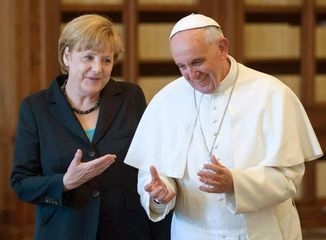
Catholics for Renewal
Subtitle
Editorial October 2020

Francis on Women: The Need for Discernment
The history of women
in the Catholic Church has long been a one of misogyny. Scripture is clear that
this sin did not start with Jesus of Nazareth, nor his apostles and early
disciples, who were both women and men.
Regrettably, Jesus’ relationships with women came to be ignored or misrepresented; why and how is for another day. Right now we have a Jesuit pontiff who, in an October message, calls for engagement in the Ignatian practice of prayerful discernment on the ‘proper place of women in the Church’[1]. Such discernment requires that we become aware of the movements in our hearts, understand where they come from, and either accept or reject them[2].
Photo: Pope Francis discerning with German Chancellor Angela Merkel*
First, we need to recognise that prayerful discernment cannot discern God’s will for women if it is based on a theologically flawed understanding of women. In Evangelii Gaudium Francis exposes that flawed understanding, stating “that the legitimate rights of women be respected, based on the firm conviction that men and women are equal in dignity” (n. 104). The word ‘legitimate’ expresses an unacceptable constraint on women’s equality within the Church. The man can ‘legitimately’ aspire to receiving the sacrament of Holy Orders, but the woman cannot. There is no possibility of genuine prayerful discernment when the foundation is fundamentally flawed.
Secondly, many Australian Catholics have already exercised extensive discernment in this matter. For the past fifty years, at least, women and men of faith, be they clergy, religious, or laity, have discerned the need for women to have full and equal rights in the Church, including the right to receive the sacrament of Holy Orders.
The most recent and compelling evidence for this statement of fact can be found in the Final Report on Phase 1, the 6 Discernment Papers and the 28 Diocesan Reports that will form the basis of the agenda for the Plenary Council. [3]
An analysis of the Diocesan Reports shows that, in general terms, the issue of ‘Greater role for Women’ was the ‘most prominent’ and ‘most widely discussed’ in 26 of the 28 territorial dioceses, and that within 21 of those dioceses it was the #1 issue. Furthermore, the particular issue of the ‘Ordination of Women’ was also the ‘most prominent” and ‘most widely discussed’ in 26 of the 28 territorial dioceses, and within those dioceses it was the #1 issue in 2 dioceses, #2 in 14 , #3 in 9, and #4 in 1. Put another way, 80 per cent of engaged Catholics in Australia are concerned about the lack of equality for women in the Church. The baptism of a woman provides no possibility of a path to the Sacrament of Holy Orders.
Finally, discernment
does not mean simply praying to God for what we want; that would be childish
and treating God as a vending machine into which we popped our three Hail Marys
and out came a sunny day for the basketball match on Saturday. God has already
given us everything we need to make the right decisions to bring about the
reign of God. We have to take our
baptismal responsibilities seriously.
God will accompany us as we make our choices, but we have to discern the
choices without resorting to unexamined assumptions. Those who do not like the responses that the
people of God have already provided to the Plenary Council question “What do
you think God is asking of us in Australia at this time?” must put aside
any pre-judgements about the equality of women in the Church and thus their rightful
place within it. One cannot engage in prayerful discernment if the intent is
only to tinker around the edges, refusing to recognize the movements of the
heart and their source.
The vast majority of
engaged Catholic women and men in Australia have made it clear that they do not
want women to have ‘greater’ roles; they want them to have ‘equal’ roles. They have already discerned the signs of
women’s debasement within the Church. The
time for action has now arrived.
Just as Pope Francis has
amended canon law in regard to the Pontifical Secret, he could also require all
diocesan bishops to convene diocesan synods or assemblies, currently best practice in canon law, to
discuss how to ensure women have the graced right to receive the sacrament of Holy Orders.
Photo: telegraph.co.uk Guido Bergman / German Federal, 2013
[1] Pope Francis, https://www.vaticannews.va/en/pope/news/2020-10/pope-francis-prayer-intention-ocotber-women-leaders-church.html
[2] Gallagher, Fr. Timothy. The Discernment of Spirits, 17.
[3] Wilkinson, Peter, ‘Most prominent issues for the Plenary Council agenda’ in The Swag, Winter 2020